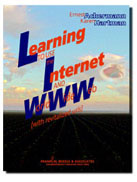| Summary Terms Exercises |
|
Chapter 7 |
|
|---|---|
Supplemental Material (available on CD with book)
- "Services Available Through Discussion Groups" (PDF)
- "Finding a Discussion Group" (PDF)
- URLs from the chapter (HTML)
- Copies of the review questions in quiz format (PDF)
Discussion Groups
Email discussion groups are examples of asynchronous group communication on the Internet. Group members communicate via email, with messages broadcast to all group members.
Several thousand discussion groups are available and active on the Internet. The email groups may be called mailing lists, discussion groups, Listserv lists, or interest groups. Regardless of the name, each consists of a group of members on the Internet. This way, communities or collections of people can discuss items related to a common topic, find information about the topic, make announcements to the group, and ask questions and receive help from other group members. The large number of groups or lists guarantees a wide range of topics. The groups are particularly useful to people who want to discuss issues with a large or diverse group. The groups extend any resources beyond a local site.
When you communicate with an email discussion group, you send messages to the list by using the list address. Commands and requests for service are usually sent to the administrative address. For example, the group SF-LIT, which deals with a variety of topics related to science fiction literature, has SF-LIT@loc.gov as the list address and listserv@loc.gov as the administrative address. You use this second address to join the group, leave or unsubscribe from the group, request archived files from the group, and get a list of the members of the group. Be sure you use the correct address when you communicate with the group or list. A discussion group also can be Web-based so that you use a Web browser to join, read, and contribute to the group.
Discussion groups and Usenet newsgroups can be thought of as communities of people sharing common interests. There are generally accepted rules of behavior or etiquette for list members. These include providing appropriate, thoughtful, and concise messages to a group, providing a summary of the responses received in answer to a question, and communicating with other group members in a civil and respectful manner.
Usenet
Usenet news is a collection of messages called articles. Each article is designated as belonging to one or more newsgroups. These articles are passed from one computer system to another. The newsgroups are arranged into categories in a hierarchical manner. Users at a site can usually select any of the groups that are available and can often reply to or post an article. Some estimates put the number of participants at more than 40 million people worldwide.
Software called a newsreader allows you to work with the articles and newsgroups in Usenet news. Several different newsreaders are available. The one you use will depend on your preferences and what's available on the system with which you access Usenet.
Usenet is a valuable resource for information on a wide array of topics.
It can be enjoyable to read and participate in the discussions. Services
are available on the World Wide Web to search for newsgroups related to
a specific topic and to search for articles that contain keywords or phrases.
Terms
Exercises
Available on CD with book.
This material has been prepared to accompany the book "Learning to Use the Internet and the World Wide Web" (ISBN 1-887902-78-3) by Ernest Ackermann and Karen Hartman, and published by Franklin, Beedle and Associates, Incorporated, Wilsonville, OR. © 2002. No part of this may be reproduced, stored in a retrieval system, or transcribed without permission of the publisher.
| You can help support this site by buying books, CDs, and other items after clicking on this link. |  |
Number of visits here since May 10, 2002.
